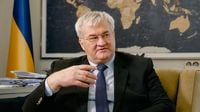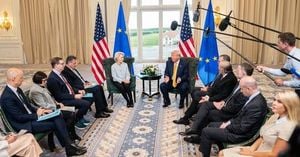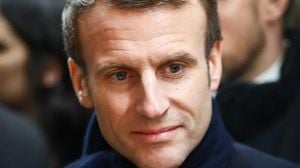Ukrainian President Volodymyr Zelenskyy is preparing for a pivotal week on the world stage, as he and his delegation head to New York for the 80th session of the United Nations General Assembly. From September 21 to 26, 2025, Zelenskyy will be joined by Ukraine’s Foreign Minister Andrii Sybiha and other top officials for a series of high-stakes diplomatic engagements, with the spotlight firmly fixed on a scheduled meeting with U.S. President Donald Trump.
According to AFP and European Pravda, the Ukrainian president confirmed on September 20 that he would meet President Trump on the sidelines of the UN General Assembly. The agenda, Zelenskyy said, will focus on security guarantees for Ukraine and the ongoing sanctions regime against Russia. "Meeting with the President of the United States" is a crucial step, as Zelenskyy put it, in Ukraine’s ongoing push for Western-backed security guarantees to prevent future Russian aggression.
But the stakes are even higher than usual this year. The war in Ukraine, now deep into its third year, has reached a grinding stalemate, with US-led efforts to broker a swift end to the conflict stalling. Russia, for its part, has flatly ruled out any meeting between President Vladimir Putin and President Zelenskyy—a diplomatic impasse Kyiv says is the only viable path to peace. As AFP reports, Zelenskyy did not mince words: "We expect sanctions if there is no meeting between the leaders or, for example, no ceasefire." He added, "We are ready to meet with Putin. I have spoken about this. Both bilaterally and trilaterally. He is not ready."
Meanwhile, the Kremlin has issued a stark warning of its own. Russian President Vladimir Putin declared that any Western troops deployed to Ukraine would be considered both unacceptable and legitimate targets. This rhetoric underscores the tense atmosphere surrounding the General Assembly and the broader diplomatic efforts to end the war. As AFP notes, Ukraine’s leadership continues to advocate for "joint solutions" with other countries, particularly regarding the challenge of shooting down hostile drones over Ukrainian territory.
Foreign Minister Andrii Sybiha’s role in this diplomatic offensive is equally significant. As reported by European Pravda, Sybiha will participate in high-level events alongside Zelenskyy and will also hold a series of separate engagements. One focal point of his agenda is a thematic discussion on energy resilience and green recovery in Ukraine—a topic that has grown increasingly urgent as the war continues to devastate the country’s infrastructure and energy grid.
The Ukrainian delegation’s calendar is packed with bilateral and multilateral meetings. Diplomats from Europe, North America, Asia, Africa, Latin America, and the Middle East are all on the list for talks, reflecting Ukraine’s determination to rally as broad a coalition of support as possible. The visit may also include a meeting between Zelenskyy and Polish President Karol Nawrocki, further highlighting the importance of regional alliances in Ukraine’s diplomatic strategy.
Back home, the situation remains precarious. On September 20, Zelenskyy reported "intense actions" in the northeastern Kharkiv region, specifically in the Kupyansk area—a critical railway hub that Ukraine recaptured during its 2022 offensive. The fighting in this region remains fierce, and the outcome could have significant implications for the broader conflict. As Zelenskyy told AFP, the push for security guarantees and increased international support is not just about future threats—it is about responding to the immediate, ongoing dangers faced by Ukrainian forces and civilians alike.
The context for these diplomatic maneuvers is complex. Since Russia’s full-scale invasion in 2022, Ukraine has sought a combination of military, economic, and political support from its Western allies. The question of security guarantees has been at the heart of these discussions, with Kyiv arguing that only robust, enforceable commitments from the West can deter further Russian aggression. But as the war drags on, fatigue and political divisions have complicated efforts to maintain a unified front.
Sanctions against Russia remain a central pillar of the Western response, but their effectiveness is a subject of ongoing debate. Zelenskyy’s statement—"We expect sanctions if there is no meeting between the leaders or, for example, no ceasefire"—reflects a growing sense of urgency. The Ukrainian government wants to see not only continued but strengthened sanctions, especially if diplomatic progress stalls. Yet, as AFP points out, Russia has shown little willingness to engage in direct talks with Kyiv, and the prospect of a breakthrough remains uncertain.
Energy resilience and green recovery, meanwhile, have become vital components of Ukraine’s long-term strategy. Russian attacks on infrastructure have left large swathes of the country vulnerable to blackouts and energy shortages, particularly during the harsh winter months. By highlighting these issues at the UN, Foreign Minister Sybiha aims to attract international investment and technical support—resources that will be essential for Ukraine’s post-war recovery, whenever that day comes.
The broader diplomatic effort also includes outreach to countries beyond the traditional Western alliance. By engaging diplomats from Asia, Africa, Latin America, and the Middle East, Ukraine hopes to build a more global coalition against Russian aggression. This approach recognizes the shifting dynamics of international politics, where support from non-Western countries can play a decisive role in shaping the outcome of conflicts and the enforcement of international norms.
As the Ukrainian delegation arrives in New York, the world will be watching closely. The meeting between Zelenskyy and Trump is likely to attract the most attention, given the outsized role the United States plays in global security and the ongoing debate within the U.S. about the extent of American support for Ukraine. But the outcome of the week’s discussions will depend on more than just one high-profile handshake. It will hinge on Ukraine’s ability to persuade a diverse array of international actors that its cause is both just and urgent—and that the cost of inaction, for Ukraine and the world, is simply too high.
With the war showing no signs of ending soon and the humanitarian, economic, and security stakes mounting, Zelenskyy’s trip to the United Nations could mark a turning point—or at least set the tone for the next critical phase of Ukraine’s struggle for sovereignty and peace.




